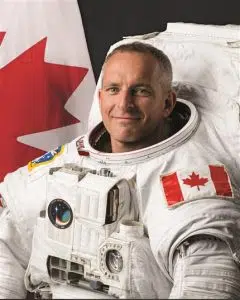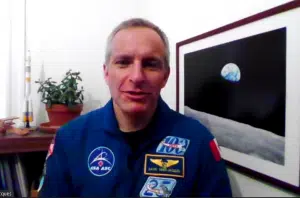Kids at a local middle school will never have to wonder why the sky is blue but space is black because an astronaut explained it to them.
Quispamsis Middle School won a visit from Canadian astronaut David Saint-Jacques through the Junior Astronauts program offered by the Canadian Space Agency.
The Junior Astronauts program designs activities for youth in grades six to nine in science and technology, fitness and nutrition, and communications and teamwork to interest them in a future in science, technology, engineering and math.
Saint-Jacques is an engineer, astrophysicist and family doctor. On December 3, 2018, he flew to the International Space Station and spent 204 days in space, the longest Canadian mission to date.
Saint-Jacques told his audience to take care of themselves, especially when it comes to physical and mental health. He said they might feel young and like they will be healthy forever but they still need to take care of what they eat, much they sleep, and to exercise at least a little bit.
“Your body really is the most important tool you have to accomplish whatever dream you have,” he said.
Saint-Jacques said it’s never too early to practice taking responsibility and becoming a person worthy of confidence.
“As a child, a lot of people make decisions for us and that’s OK but eventually, slowly you need to become responsible for yourself and it’s always good to practice holding your promises to practice taking responsibility for things and becoming someone others can trust I think is really important for whatever you want to do in life,” he said.
Saint-Jacques said it’s important to have fun because you need to have a balance.
“We all want to be someone useful and we all want to be the most beloved person but you have to have fun because you’re no good when you’re sad and the only way to have fun and be successful in your career is to do something you love,” he said.

Canadian astronaut David Saint-Jacques (Photo: Courtesy of the Canadian Space Agency)
Saint-Jacques said it was harder to adjust back to Earth than it was to adjust to space. He said he lost his sense of balance, his body forgot to pump blood more to his head than his feet, and like he had the flu or was moving in slow motion which astronauts tend to call “Space Brain.”
One question asked was how he took care of his mental health.
He said when he was having a hard day, he would go to the window and look at Earth to remember why he’s doing it. He said because of the pandemic, it’s like every person is an astronaut in their home dealing with many similar problems on a different scale.
“There’s graffiti on the space station left by a very old astronaut from a very long time ago it says the most important thing is what you’re doing right now,” he said.
Saint-Jacques said one way to do well is to resolve to talk more to avoid explosions but leave others alone if they need space. He suggested getting organized, don’t stay in pyjamas all day, and make a schedule otherwise, you won’t achieve what you want.
“Sometimes we have a dream that seems too big, too crazy, too ambitious, and we’re afraid that we’re not going to make it. The error is to decide not to try in case we fail. That would be a big mistake,” said Saint-Jacques.
“Your dream is not a destination, it’s just a direction. It’s like the North Star. You’ll never get to the North Star ever, but you can still use it as a guide.”
Some of the questions asked were:
- How long did it take to re-adjust to the gravity on Earth (One week before he could walk without holding someone’s hand, a month before he could ride a bike and two months to feel normal)
- What was the hardest training he took (Learning to speak Russian in order to learn to fly the Russian rockets, plus the three years away from his family and the balance between work, family and friends)
- What were some of the first noticeable changes his body experienced in a zero-gravity environment (The feeling of his organs floating up, like jumping off a high diving board, and nausea, congestion and disorientation)

Canadian astronaut David Saint-Jacques (Photo: Screengrab)
- How can you tell when you pass through the atmosphere (the rocket stops shaking)
- What it was like when he first arrived at the space station (The feeling that it had moved from being a machine to a home with his friends)
- How often were you able to communicate with people on Earth and how often is it with family (Making a call depends on the satellite connection. He called his wife at least every day and every weekend had a video conversation with his family)
- Was there anything he had to improvise for on the ISS (Some repairs needed to be done because there was no procedure so every day there was improvisation because you can’t plan everything)
- If space has a sun, why is it so dark (In space even during the day you see the sun while on Earth the sky is blue because sunlight goes through the atmosphere, then diffuses depending on the colours but the blue light doesn’t go straight through although red does. Space is black because it has no reason to be any other colour)
- Is it possible to one day live on Mars (There’s a lot of issues about living in space so first, we have to get Mars, then we have to deal with the radiation, and then figure out how to land people on Mars ready to work, or to keep them alive since Mars has nothing we need so that will need to require life support systems)
https://news.google.com/__i/rss/rd/articles/CBMiW2h0dHBzOi8vd3d3LjkxOXRoZWJlbmQuY2EvMjAyMS8wMy8zMS9hc3Ryb25hdXQtdGFsa3MtcGh5c2ljYWwtbWVudGFsLWhlYWx0aC1zcGFjZS1hbmQtbWFycy_SAQA?oc=5
2021-04-01 10:54:42Z
CBMiW2h0dHBzOi8vd3d3LjkxOXRoZWJlbmQuY2EvMjAyMS8wMy8zMS9hc3Ryb25hdXQtdGFsa3MtcGh5c2ljYWwtbWVudGFsLWhlYWx0aC1zcGFjZS1hbmQtbWFycy_SAQA
Tidak ada komentar:
Posting Komentar